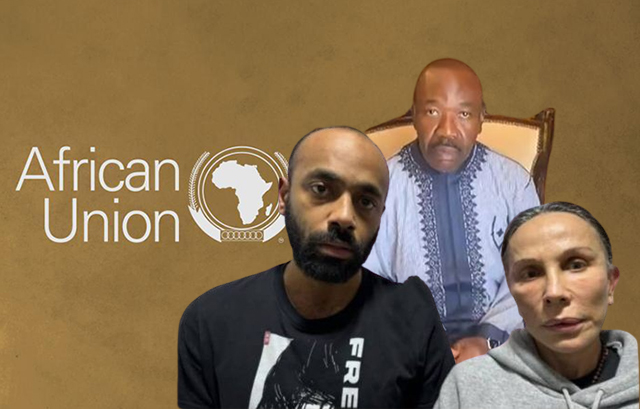L’Union africaine n’oublie pas la famille Bongo

Si elle a annoncé la levée des sanctions contre le Gabon ce mercredi, l’Union africaine a également formulé quelques recommandations à l’endroit des autorités de Libreville, dont certaines portent sur la situation d’Ali Bongo en tant qu’ancien chef d’État et celle de son épouse Sylvia et de son fils aîné Noureddin Bongo Valentin, tous deux détenus depuis 20 mois sans procès.

Le CPS de l’Union africaine préoccupé par la situation des Bongo au Gabon. © GabonReview (montage)
Ce mercredi 30 avril, le Gabon a officiellement réintégré l’Union africaine (UA) qui l’avait sanctionné 20 mois plus tôt à la suite du coup d’État du 30 août 2023 ayant mis fin au pouvoir d’Ali Bongo. Depuis, l’ex-président gabonais est cloîtré à sa résidence de la Sablière, étroitement surveillé par la Garde républicaine, même si les militaires assurent, sourire en coin, qu’il est «totalement libre de ses mouvements, y compris de quitter le pays». Son épouse et son fils aîné quant à eux sont détenus, dit-on, à la prison centrale de Libreville.
Quoi qu’en dise le pouvoir actuel, la situation de ces trois membres de l’ancienne famille régnante constitue un sujet de préoccupation pour l’UA. Aussi, l’institution, par l’entremise de son Conseil de paix et de sécurité (CPS), a-t-elle accompagné sa levée de sanctions par un certain nombre de recommandations. Celles-ci portent, entre autres, sur le traitement réservé à Ali Bongo, en tant qu’ancien chef d’État, sur le sort réservé à Sylvia et Noureddin Bongo Valentin pour lesquels un procès serait le bienvenu pour rassurer la communauté internationale sur la volonté du Gabon de renouer véritablement avec l’État de droit. C’est d’ailleurs dans cette optique qu’il est attendu de Libreville l’organisation, dans les meilleurs délais, des procès contre toutes les personnes interpellées après l’arrivée des militaires au pouvoir.
En adressant, le 26 avril dernier, ses «chaleureuses félicitations» à Brice Clotaire Oligui Nguema pour sa victoire à présidentielle organisée deux semaines plus tôt, Mahmoud Ali Youssouf, président de la Commission de l’Union africaine, n’avait pas manqué d’encourager les autorités nationales «à poursuivre leurs efforts en faveur du renforcement de la démocratie, de la bonne gouvernance et de l’État de droit». Les premiers mois du mandat du nouveau chef de l’État gabonais, qui prêtera serment ce samedi 3 mai, seront scrutés par l’institution panafricaine.


















2 Commentaires
En réalité, l’Union africaine s’apparente bien davantage à un syndicat de chefs d’État, souvent liés par des réseaux d’intérêts, voire maçonniques, comme ce fut le cas d’Ali Bongo, qu’à une véritable organisation engagée pour la dignité et la défense des peuples africains. Elle se montre fréquemment plus prompte à défendre les intérêts individuels des hommes de pouvoir et de leurs réseaux qu’à protéger les droits fondamentaux des citoyens. Loin de servir d’instrument de souveraineté populaire, elle apparaît trop souvent comme un rempart au service des régimes en place.
Human rights are standards that recognize and protect the dignity of all human beings. Human rights govern how individual human beings live in society and with each other, as well as their relationship with the State and the obligations that the State have towards them.
Human rights law obliges governments to do some things, and prevents them from doing others. Individuals also have responsibilities: in using their human rights, they must respect the rights of others. No government, group or individual person has the right to do anything that violates another’s rights.
Universality and inalienability
Human rights are universal and inalienable. All people everywhere in the world are entitled to them. No one can voluntarily give them up. Nor can others take them away from him or her.
Indivisibility
Human rights are indivisible. Whether civil, political, economic, social or cultural in nature, they are all inherent to the dignity of every human person. Consequently, they all have equal status as rights. There is no such thing as a ‘small’ right. There is no hierarchy of human rights.
Inter-dependence and inter-relatedness
The realization of one right often depends, wholly or in part, upon the realization of others. For instance, the realization of the right to health may depend on the realization of the right to education or of the right to information.
Equality and non-discrimination
All individuals are equal as human beings and by virtue of the inherent dignity of each human person. All human beings are entitled to their human rights without discrimination of any kind, such as race, color, sex, ethnicity, age, language, religion, political or other opinion, national or social origin, disability, property, birth or other status as explained by the human rights treaty bodies.
Participation and inclusion
Every person and all peoples are entitled to active, free and meaningful participation in, contribution to, and enjoyment of civil, political, economic, social and cultural development, through which human rights and fundamental freedoms can be realized.
Accountability and rule of law
States and other duty-bearers must comply with the legal norms and standards enshrined in human rights instruments. Where they fail to do so, aggrieved rights-holders are entitled to institute proceedings for appropriate redress before a competent court or other adjudicator, in accordance with the rules and procedures provided by law.